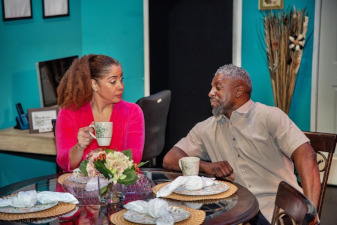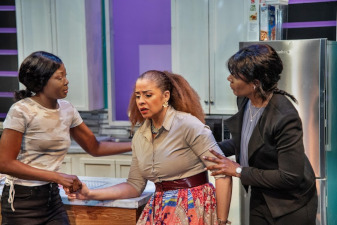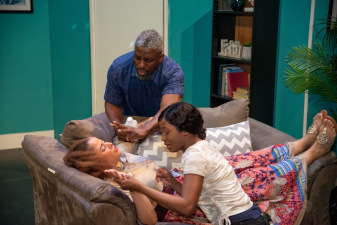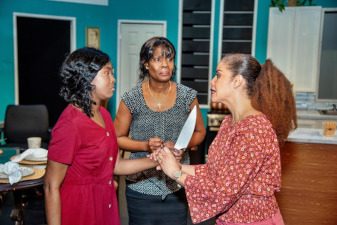
Beate
Hein Bennett
Everybody
wants to reap… April 7 -10, 2022: The Theater at the 14th Street Y, 344
E. 14th Street, Manhattan, NY
The famous saying “God works in mysterious ways” can certainly be applied to the actions in Jamaican playwright Dahlia Harris’s play, "God’s Way." It is a tightly scripted family drama around an absent father whose hidden economic activities are the source of the prosperous life of his wife and daughter as well as their undoing. It is the revelation of his criminal activities that drive the conflict between mother and daughter, and the moral question of what is really God’s way. How should we conduct our lives? According to whose values? Is the Bible simply a book for salient quotations, or a source for the just life? To whom are we ultimately accountable for our actions? These questions are explored in quickstep through the sudden turmoil that throws the mother Valerie and her young daughter Georgia into a tailspin of existential threat. A woman friend, Samantha and a family friend, the Deacon of the parish church to which Valerie belongs try to help them sort out the unexpected turn in their fortune.
The moral challenge is two-fold: Valerie, the mother has to come to grips with her own hypocrisies, a certain social pride that is rooted in her economic upward mobility that is manifested in her stylish tidy middle-class home. Her modest salary as a civil servant in the Labor Dept. would not have made this level of residence possible, yet she never questioned the source of her husband’s finances—she simply believed that his farm work in the US enabled it. She is a devout member of her church in St. Andrews Parish and very conscious of the respect accorded to her by that community. (She expresses her disdain of her friend Samantha’s living in the “ghetto.”) Georgia, her daughter, 21 and a successful college student, struggles with her promise of loyalty to her father but also being aware of his criminal activity being the source of their comfort. She has hidden the real wealth from her mother but also feels compelled to protect her father, even to the point of endangering her and her mother’s free existence. She thinks she alone can save him and them. While she can quote the bible as well as any of them, it is clear that she sees through the hypocrisy of the community of believers. And thus mother and daughter come to literal blows—over feelings of love and betrayal, as well as over how to solve their actual existential problem.
Director Keenan N. Charles moves the play, set in present-day Jamaica, forward with a clarity that allows the actors to establish their character and develop the intimate relationships with each other, each of which undergoes a profound stress. Set designer Harlan Penn provides all the ingredients of a realistic set with specific locales inside teak colored walls and a peaked roof that includes a central kitchen with a window to the Caribbean sky, stage right a dining table set for dinner, and stage left a sitting room set with a couch, a table, an easy chair, and an implied TV set. Lighting Designer Monee Stamp creates the light effects of a changing Caribbean sky from mauve sunset to rosy dawn and bright sun-lit day. Sound designers Joel Edwards and Andrew Clarke underscore the atmosphere, sometimes in ironic counterpoint, with popular Jamaican songs and religious hymns. Costume Designer John Eli Dacosta gives each character their appropriate clothing: ultra-feminine sun-colored pretty dresses for Valerie, sober business dress for school counselor Samantha, white shirt and pants for taxi-driver Deacon, and typical casual pants and t-shirt for Georgia.
Last not least, kudos go to the actors: Marsha-Ann Hay plays Valerie with all the colors that the role demands—charm, quick wit, elegance, confusion, despair, courage, and ultimately positive strength of spirit. Epiphany Samuels brings to Georgia the bright steeliness that can utterly rattle a parent but there is also the child’s desperation and confusion when she finds herself way over her head in an impossible situation. Mitzie Pratt’s Samantha is a fiercely independent and clear-headed woman—the kind of friend one would want in desperate times—and with a wicked sense of humor. The only male character, Deacon, is deeply entrenched in the way of the Bible and the church—he firmly believes that the salvation lies in the strict patriarchal discipline of a faithful life. Jerry Benzwick plays the simple faithful man with conviction but he also imbues the traditional male chauvinistic behavior with a humorous wink, and finally comes through as the trustworthy practical generous friend. The entire ensemble sings the text with the requisite beautiful Jamaican lilt and with a keen sense of the absurdity of the human condition that is perhaps behind the mystery of God’s Way. |
| recordings | coupons | publications | classified |




